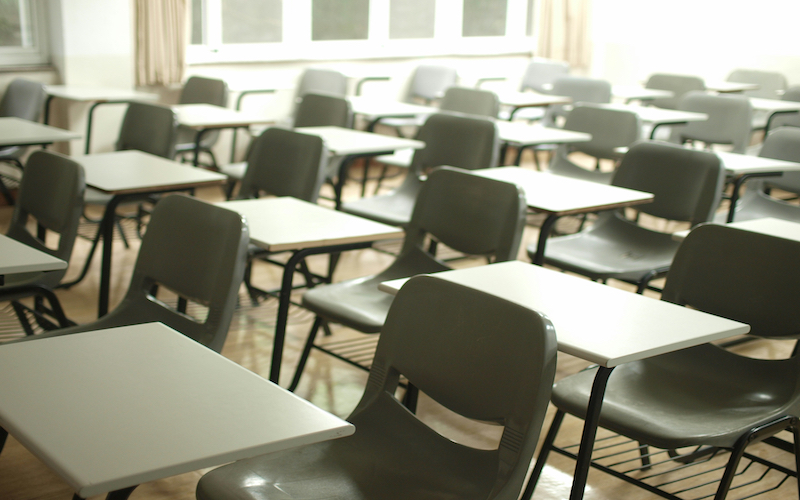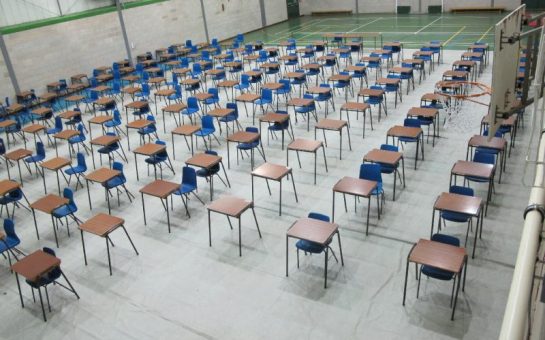The number of unregistered schools investigated by Ofsted has increased by more than a third since August, according to official data released by the Department for Education (DfE) in March.
Just under half of the 107 unregistered settings investigated between September and March went on to receive a full inspection, with 59 settings being inspected during this time period.
Ofsted began formally investigating unregistered schools in 2016, and has been publishing bi-annual datasets since 2020.
The government body defines an unregistered school as an illegal setting that operates as an independent school without registration with the DfE, by providing full-time education to five or more pupils of compulsory school age, or at least one pupil with special education needs, an education health care plan (EHCP) or who is looked after by a local authority.
By far the largest percentage of unregistered schools investigated are unregistered alternative provision (AP) schools which cater for children who have either been excluded from school or cannot attend mainstream school due to significant health needs, which accounts for 36% of all unregistered schools investigated, or 39 of the overall 107 settings.
Mark Wrangles, founder of education consultancy Close the Gaps, which offers support and advice to unregistered APs in providing quality education, told North East Londoner that there is a growth in the registered and unregistered AP market at the moment, though there is evidence of it from the late 2010s.
Wrangles said: “In my opinion it is driven by several factors. To start with, the mainstream education system has become more academic and knowledge-focussed since the new inspection framework came in.
“It has also seen trends for zero tolerance discipline approaches, this means the numbers of young people who don’t fit in the system has increased.
“Secondly, the education system as a whole has seen a lowering of funding and availability of the support services (CAHMS, Educational psychologists, SEN specialist provisions etc) that we could originally use to promote inclusion.
“More children now don’t meet thresholds and fall through the gaps.”
He added that a third reason is that in the past few years there has been a huge increase in SEN diagnosis – particularly around Autism and ADHD.
Wrangles added: “These factors have increased the number of young people unable to access mainstream school.
“The rise in unregistered provisions comes from parents and professionals seeing this need and trying to step into the gap.
“In some cases it is also driven by businesses spotting the money that is spent on pupil support – there are some national AP chains who have been funded by private equity money as they have spotted it is a growth market.”
However, the rise of unregistered AP does not account completely for the rise in unregistered settings being investigated by Ofsted.
The data from DfE shows that in 2023, tuition centres made up for almost 13% of total investigations, which includes settings which underwent multiple investigations.
In that same year, 16% of unregistered settings fell under the general education category, which refers to schools which teach the traditional curriculum of English, Maths, Science etc alongside other subjects, often religious study.
Schools that solely offer religious instruction account for the fourth largest number of overall unregistered settings investigated, with 133 of the 1,223 unregistered schools Ofsted has investigated since 2016 being faith schools, making up for 11% of the total number of settings investigated.
Andrew Banks is a Solicitor Advocate at Stone King, a law firm which offers specialist expertise in multiple sectors including charity, faith and education, and has extensive experience in defending schools and other educational institutions in the courts.
He has previously defended educational institutions regarding offences of conducting an unregistered independent school.
Banks explained he has predominantly advised unregistered tuition centres which are often used by young people who have been excluded from mainstream education and want something bespoke in a small setting, as well as for home-educated children.
Explaining how these tuition centres end up breaching Ofsted regulations, Banks said: “What sometimes happens is that they start out having an awareness of the regulations, and you have say four children of compulsory school age.
“And then they take on someone with an EHCP or they take on a couple of extra children.
“Another thing that happens is they start out as a sixth form tuition centre, obviously not of compulsory school age, and then they start taking on children who are of compulsory school age, and before they know it they’ve got more than five.
“So these problems occur incrementally, and local authorities will place children at these establishments, and some of them are really, really good.
“A lot of them are really good, actually. They’re just not registered so they’re not regulated.”
He added that the other common issue was unregistered tuition schools going over the 18 hour per week limit, which is what is stated in DfE guidance on what likely constitutes full-time education, although this is not defined in any statute.
Banks said the DfE held a consultation in 2020 on providing a definition of full-time education in the law, but the outcome of the consultation was never published and the guidance hasn’t changed.
He reflected: “So the guidance we have is something that’s rather ambivalent and that’s where a lot of schools have difficulties.
“A lot of them provide 17 and a half hours of education and think that’s okay. What they’re missing is that the other part of the guidance that says, ‘are you providing the child with all or a substantial part of their education?’
“So this 18 hour rule is something that unregistered independent schools have a problem with because they see that in black and white and don’t realise that in fact the real benchmark is whether they’re providing all or a substantial part of a child’s education.”
Banks emphasised that many of these unregistered tuition schools do want to be registered since they see a market for the services they provide and want to expand.
However, he explained that the application to become a registered school is not a straightforward one, and the fear of having an application rejected is holding some unregistered schools back from registering.
If an unregistered school applies for registration and the application is rejected, it must be shut down immediately, meaning that all of the staff working in the school will lose their jobs.
Explaining the dilemma for unregistered schools on whether or not to register, Andrew remarked: “The worst thing in the world is you’re not really prepared for it, and you make the application and you fail, and then you’ve got a real problem.
“Because if it’s the case that you’re running what is a de facto unregistered independent school and you get investigated and you say ‘look I’ve completed an application and I’lll submit it now,’ and you then subsequently get registered, you’re not going to get prosecuted in those circumstances, it would be highly highly unlikely.
“However, and I’ve had this happen actually, if you apply for registration and you fail, where does that leave you? Because you’ve indicated that you accept you need to register, you’ve made a registration, you’ve got the children in the establishment, and then suddenly they’re saying what you’re doing at the moment is not right, the health and safety isn’t good enough or whatever the case may be.”
The data on the number of unregistered schools judged by Ofsted as having health and safety and safeguarding concerns supports Andrew’s point, with 23% of the 107 unregistered schools investigated between September and March being identified as having health and safety concerns, and 21% as having safeguarding concerns.
Echoing this point with regards to unregistered AP, Wrangles said: “Many of these unregistered APs want registration, they want a vote of confidence on issues of safeguarding and health and safety, they want that level of trust.
“But a lot of these unregistered APs are small settings that struggle to meet the health and safety requirements which are very strict.
“For example, one of the requirements is that the temperature of the taps has to be less than 44 degrees Celsius. But if you’re basing your setting on a farm, you may not be able to fulfil that requirement on your premises.
“There is variability in unregistered provisions though schools work very hard to check and monitor the places they use.
“In some areas the LAs do a great job of this too, in others they don’t. The approach can be extremely varied.”
In August last year the think tank Centre for Social Justice published a paper in which it called for a framework for the regulation of unregistered AP in order to better ensure the safety of vulnerable children attending these schools.
Last month, the DfE launched a consultation entitled ‘Strengthening provision in unregistered alternative provision,’ in which it puts forward its proposals for a framework to regulate unregistered APs.
The consultation seeks the views of unregistered AP providers, local authorities and parents of children attending unregistered APs on their views on its proposals, and closes on 5th July.
Beth Prescott, Programme Lead at the Centre for Social Justice, said: “We welcome the DfE’s consultation on this and will be putting together our response over the next few months.
“When we conducted our research last year, we found that there are some very good APs giving great support to students.
“But it’s a bit of a Wild West out there with the lack of regulation and oversight, so it’s really important that APs are brought under a bespoke framework so that every child can have a quality education.”
Wrangles told North East Londoner that he has already contributed his views to the consultation, and overall takes a positive view on the recent data’s findings.
He said: “Given the increase in numbers it is not surprising that more would be investigated – the DfE and Ofsted have also increased their focus on it and are moving to regulation in this area (SEND and AP Plan) and more focus will mean finding more issues – this is a good thing for the sector as a whole.”
However, the health and safety concerns surrounding many unregistered APs have also been found in other unregistered schools and suspected unregistered schools, including faith schools and extremist conspiracy theorist schools.
The Times Journalist Tom Ball went undercover earlier this year for an investigation into a suspected illegal school in Manchester, known as Universalkids, which was teaching children anti-state ideology.
Ball told North East Londoner he wasn’t surprised in the least when asked about the significant rise of unregistered settings with health and safety concerns and safeguarding issues found in the recently released data.
During his investigation into Universalkids, which operates from a former nightclub, Ball found a number of health and safety concerns, including rainwater dripping from the ceiling, the bathroom being covered in graffiti and the presence of “hazards everywhere” according to another teacher who worked there.
He also discovered a number of safeguarding concerns, including children being allowed to play anywhere on the premises during break times, and the children being shown hemlock, a highly poisonous plant, during one of their foraging lessons.
As part of his investigation, Ball asked the headmistress of the school he was working at whether all the teachers there had DBS checks, which is proof of an up-to-date criminal record check and is mandatory for all teachers in registered schools.
She assured him that they did, but refused to provide evidence but when Ball asked a fellow teacher whether she had a DBS check, she admitted that she didn’t.
Accounting for the lack of safeguarding and safety measures in this suspected illegal school, Ball said: “Inspectors don’t investigate these premises until they’re brought to their attention. Why would you bother making sure your school abides by health and safety guidelines and safeguarding measures if you don’t need to? If you believe that the state is the enemy, then all state mechanisms become redundant.”
A spokesperson for Ofsted said: “Our data only covers Ofsted’s work to investigate potential unregistered schools, and does not represent the whole of the unregistered schools ‘sector’.
“Many unregistered schools take steps to operate in the shadows without oversight, and would not wish for us to know about them.
“We believe the true number of unregistered schools operating in England will far exceed the number that we have uncovered through our investigative work.”
If you’re a provider of unregistered AP, or a parent of a child who attends an unregistered AP school, and would like to contribute your views to the consultation, please visit: https://consult.education.gov.uk/behaviour-attendance-exclusions-and-alternative-provision/strengthening-protections-in-unregistered-ap/
Image credit: Unsplash





Join the discussion